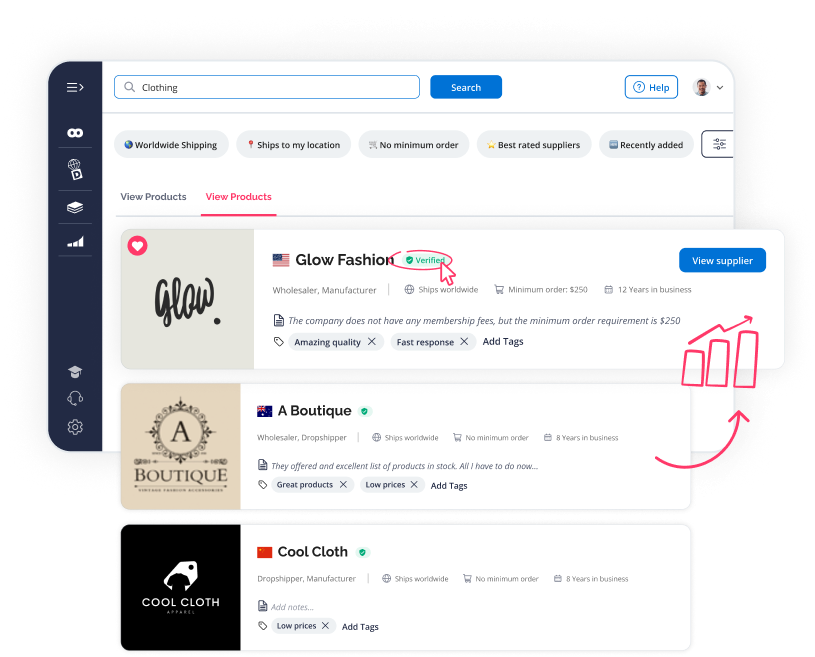Wholesale Dinnerware Suppliers for Ecommerce Sellers
Elevate your dining experience with our exceptional range of dinnerware, designed not only for aesthetic appeal but also for durability and functionality. When sourcing suppliers, prioritize those who offer a diverse selection of materials—such as porcelain, stoneware, and eco-friendly options—while also ensuring quality craftsmanship that can withstand the rigors of everyday use. Consider suppliers who provide customizable designs to differentiate your brand and enhance your customers' dining occasions

Here’s a selection of suppliers waiting for your call
Manufacturer Supplier
 Verified
Verified
 Join to contact this supplier
Join to contact this supplier
 No Minimum Order
No Minimum Order
 22 Years in SaleHoo
22 Years in SaleHoo
Products stocked
About
Manufacturer Supplier
 Verified
Verified
 Join to contact this supplier
Join to contact this supplier
 No Minimum Order
No Minimum Order
 16 Years in SaleHoo
16 Years in SaleHoo
Products stocked
About
Manufacturer Supplier
 Verified
Verified
 Join to contact this supplier
Join to contact this supplier
 No Minimum Order
No Minimum Order
 16 Years in SaleHoo
16 Years in SaleHoo
Products stocked
About
Manufacturer Supplier
 Verified
Verified
 Join to contact this supplier
Join to contact this supplier
 No Minimum Order
No Minimum Order
 5 Years in SaleHoo
5 Years in SaleHoo
Products stocked
About
Manufacturer Supplier
 Verified
Verified
 Join to contact this supplier
Join to contact this supplier
 No Minimum Order
No Minimum Order
 27 Years in SaleHoo
27 Years in SaleHoo
Products stocked
About
Manufacturer Supplier
 Verified
Verified
 Join to contact this supplier
Join to contact this supplier
 No Minimum Order
No Minimum Order
 13 Years in SaleHoo
13 Years in SaleHoo
Products stocked
About
Manufacturer Supplier
 Verified
Verified
 Join to contact this supplier
Join to contact this supplier
 No Minimum Order
No Minimum Order
 14 Years in SaleHoo
14 Years in SaleHoo
Products stocked
About
Wholesale Supplier
 Verified
Verified
 Join to contact this supplier
Join to contact this supplier
 No Minimum Order
No Minimum Order
 1 Years in SaleHoo
1 Years in SaleHoo
Products stocked
About
Wholesale Supplier
 Verified
Verified
 Join to contact this supplier
Join to contact this supplier
 No Minimum Order
No Minimum Order
 25 Years in SaleHoo
25 Years in SaleHoo
Products stocked
About
Wholesale Supplier
 Verified
Verified
 Join to contact this supplier
Join to contact this supplier
 No Minimum Order
No Minimum Order
 11 Years in SaleHoo
11 Years in SaleHoo
Products stocked
About
Other product suppliers available...
Trusted by 137,000+ entrepreneurs worldwide

7-day trial today
suppliers in the USA and internationally.
Frequently Asked Questions
Common materials for dinnerware include porcelain, stoneware, earthenware, and melamine. Each material has different durability, weight, and temperature resistance, affecting usage options and care requirements.
To assess quality, request product samples, review certifications (like FDA or LFGB for food safety), and check references or customer reviews. Consistency in quality is often indicated by long-term partnerships with clients or brands.
Lead times can vary based on order size, complexity, and supplier location, but generally range from 30 to 90 days. Always inquire about estimated production and shipping times before placing an order.
Yes, most suppliers have MOQs that can range from dozens to thousands of units depending on the type of dinnerware and production costs. It's important to negotiate MOQs that fit your business model while considering potential discounts for larger orders.
Ensure your suppliers provide documentation proving compliance with safety standards such as FDA, CE, or ISO certifications. Regularly audit and request third-party test results for chemical migration and food safety to verify compliance.


